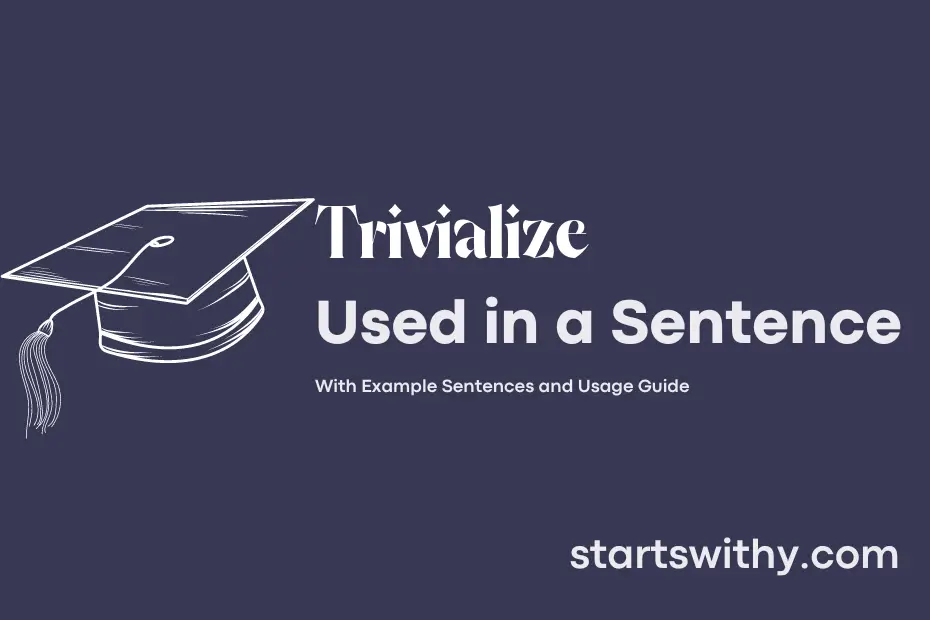Have you ever tried to make a serious point only for someone to dismiss it as unimportant or insignificant? This act of diminishing the significance or seriousness of something is known as trivializing.
Trivializing can be harmful in conversations and arguments, as it can undermine the importance of someone’s thoughts, feelings, or experiences. It can lead to misunderstandings, hurt feelings, and a lack of respectful communication.
7 Examples Of Trivialize Used In a Sentence For Kids
- Math problems may seem difficult, but don’t trivialize them.
- It’s important to listen to others and not trivialize their feelings.
- Remember to always be kind and not trivialize anyone’s struggles.
- We should appreciate everyone’s efforts and not trivialize their hard work.
- Even though something may seem small, don’t trivialize its importance.
- Let’s remember to respect each other and not trivialize someone’s differences.
- It’s best to encourage others and not trivialize their achievements.
14 Sentences with Trivialize Examples
- Trivializing the importance of submitting assignments on time can lead to decreased academic performance.
- It’s crucial not to trivialize the impact of participating in extracurricular activities for overall skill development.
- It’s common for students to trivialize the importance of maintaining a healthy work-life balance during their college years.
- Some students tend to trivialize the significance of networking and building professional relationships in college.
- It’s unwise to trivialize the value of attending lectures and actively engaging in classroom discussions.
- Many students trivialize the importance of seeking help from professors or counselors for academic or personal issues.
- Don’t trivialize the impact of procrastination on your mental health and overall academic performance.
- It’s easy to trivialize the importance of developing strong communication skills during college years.
- Students often trivialize the benefits of seeking internships or industry exposure during their academic tenure.
- It’s crucial not to trivialize the significance of time management for balancing academics, extracurriculars, and personal life.
- Some students trivialize the importance of self-care practices such as regular exercise, proper nutrition, and sufficient sleep.
- It’s risky to trivialize the impact of academic dishonesty, such as plagiarism or cheating, on your future career prospects.
- Don’t trivialize the value of participating in group projects or team activities to enhance collaborative skills in a professional setting.
- Many students trivialize the importance of setting academic goals and working towards achieving them effectively.
How To Use Trivialize in Sentences?
Trivialize is the act of making something seem less important or significant than it actually is. When using the word Trivialize in a sentence, it is important to consider the context and tone to ensure effective communication.
To use Trivialize in a sentence, start by identifying the subject or situation you want to downplay or make less significant. For example, “She tends to trivialize the importance of studying for exams.”
Next, insert the word Trivialize in your sentence in a way that clearly conveys the idea of making something seem unimportant. Here’s an example sentence: “It is not wise to trivialize the impact of climate change on our planet.”
To enhance your sentence, consider adding adverbs or descriptive phrases to provide more context and clarity. For instance, “His dismissive attitude towards the issue only serves to further trivialize its importance.”
Remember to use Trivialize thoughtfully and with awareness of its impact on the message you are trying to convey. By practicing and integrating this word into your vocabulary, you can effectively communicate the idea of making something appear less significant or important in various contexts.
Conclusion
In conclusion, using sentences that trivialize important issues can diminish the severity and impact of significant problems. When trivializing concerns through dismissive or casual language, the gravity of the subject matter is often belittled or overlooked. This can prevent genuine understanding, empathy, and action towards addressing critical issues.
It is essential to be mindful of the words we use and the tone we adopt when discussing serious matters. By avoiding sentences that trivialize important topics, we can contribute to a more respectful and informed dialogue that acknowledges the significance of the issues at hand, fostering a greater sense of awareness and empathy in our interactions.



